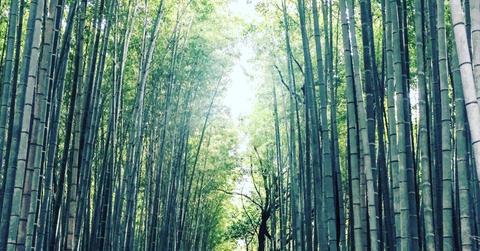Move Over, Recycled TP: Bamboo Is Here To Save Your Behind One Wipe At A Time
Bamboo is quickly becoming one of the super plants of the future. It grows easily and fast, making it a great and easy eco-friendly choice for both wood products and furniture. But bamboo has now moved to a new market: your backside.
Updated May 23 2019, 9:27 a.m. ET

Bamboo is quickly becoming one of the super plants of the future. It grows easily and fast (up to 39 inches a day), making it a great eco-friendly choice for everything from furniture and toothbrushes to flooring and sunglasses. But bamboo has now moved to an entirely new market: your backside. If you’re not ready for reusable toilet wipes but still looking for sustainable alternatives to commercial toilet paper, you might be in the market for a roll of bamboo toilet tissue.
The product has been around for years, with companies like BimBamBoo, Silk ‘n’ Soft, NatureZway, and others pushing the eco-friendly paper to the masses. But bamboo toilet tissue made fresh waves recently when it started being offered by the makers of the Tushy, an at-home bidet attachment for flush toilets.
Tushy was created by Miki Agrawal, the mastermind behind Thinx period panties and Icon, underwear for the incontinent. She’s a marketing powerhouse, and it seems everything she touches goes mainstream. Who would have thought a few years ago that bidets would actually go mainstream in the United States?
For Tushy customers who still wanted to wipe up after, the company launched a line of bamboo toilet tissue it’s claiming is unbleached, two-ply, and “silky soft.” The company’s site informs customers that 15 million trees are cut annually to make toilet paper. Adding insult to injury, an unconscionable 56 billion gallons of chemicals are used to bleach said paper.
Who actually cares that their toilet tissue is solid white, anyway?
Environmentalists have deferred to recycled TP for ages (guilty as charged), but it turns out recycled paper often has bisphenol-A (BPA) in it, as much recycled paper comes from sales receipts and newspapers—both of which contain high levels of the chemical.
While recycled TP is certainly better than paper harvested from virgin trees, bamboo TP is actually more eco-friendly. Bamboos grow and flourish until they flower then they produce seeds and die. Because the vast majority of bamboo species flower so infrequently, they must be harvested to stay alive. So unlike trees, they don't need to be replanted once they've been harvested.
The only downside to bamboo TP? The cost. A box of 12 rolls retails at Tushy for $18, a price that makes even the most dedicated green living gurus cringe. Hopefully in the future the cost of bamboo TP will be just as economical as it is sustainable.